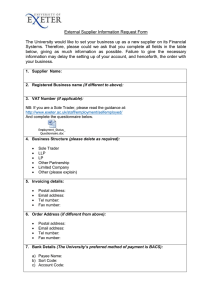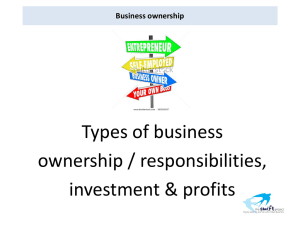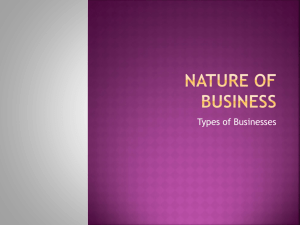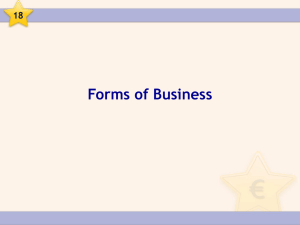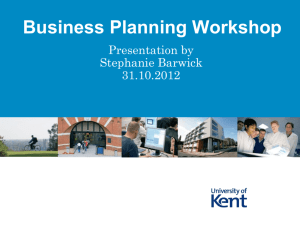Business Structure (Word Doc – 60kb)
advertisement
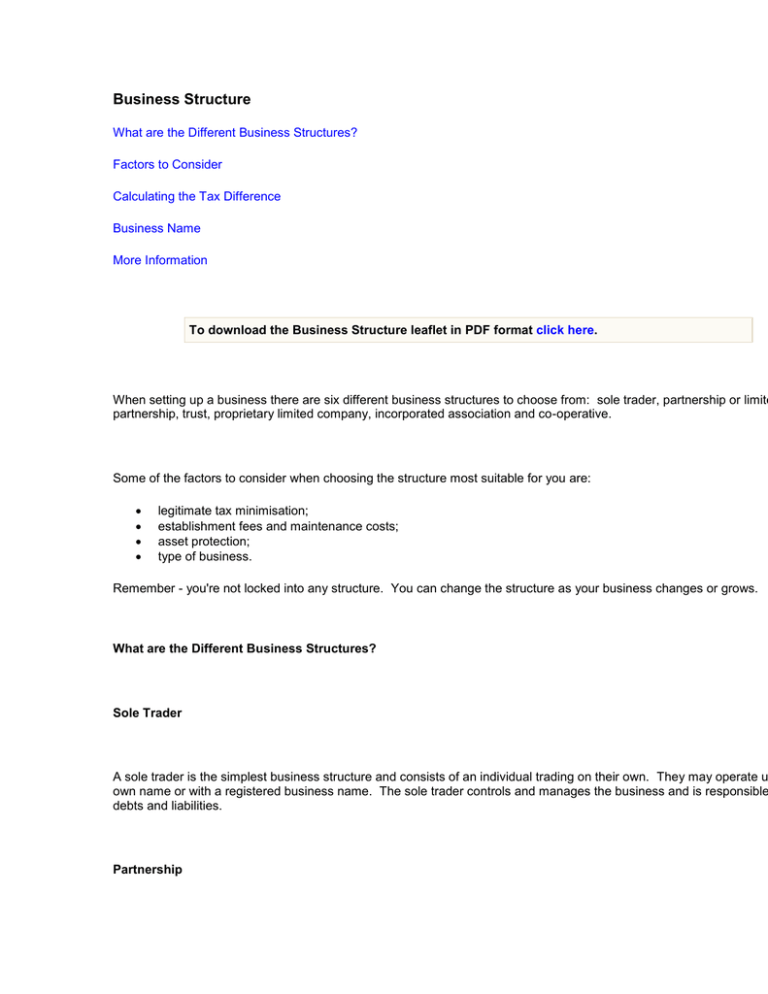
Business Structure What are the Different Business Structures? Factors to Consider Calculating the Tax Difference Business Name More Information To download the Business Structure leaflet in PDF format click here. When setting up a business there are six different business structures to choose from: sole trader, partnership or limite partnership, trust, proprietary limited company, incorporated association and co-operative. Some of the factors to consider when choosing the structure most suitable for you are: legitimate tax minimisation; establishment fees and maintenance costs; asset protection; type of business. Remember - you're not locked into any structure. You can change the structure as your business changes or grows. What are the Different Business Structures? Sole Trader A sole trader is the simplest business structure and consists of an individual trading on their own. They may operate u own name or with a registered business name. The sole trader controls and manages the business and is responsible debts and liabilities. Partnership A partnership is formed when two or more people (up to 20) go into business together with a view to making a profit. T operate under their own names or with a registered business name. Limited partnerships involve passive investors wh involved in managing the business. Key items to include in a partnership agreement: The commencement date and duration of the partnership. The treatment of partnership property and leases undertaken. Conditions under which partners can assign or change their interest in the partnership. Apportionment method for profit, capital and losses of the partnership. Person(s) of authority to make payments on behalf of the partnership. Method of valuation of assets upon dissolving or altering the partnership. Whether majority decisions of partners govern all matters. Agreement to engage an independent accountant. Proprietary Limited Company A company is an independent legal entity able to do business in its own right. The shareholders own the company and run the company. The directors of a company, as well as company employees, can be shareholders. A company's operations are subject to the Corporations Act 2001, overseen by the Australian Securities and Investmen Commission (ASIC). This Act simplified regulations to allow a company to have only one director and only one membe Co-operative Co-operatives are businesses that are member-owned, controlled and used. They are distinguished from other forms o incorporation by their participative ownership, democratic structure and use of capital for mutual rather than individual b Co-operatives supply goods and services to their members or to the general public in areas as diverse as retailing, manufacturing, labour hire, printing and agriculture. There are both trading and non-trading co-operatives. Incorporated Association An association is an alternative to forming a company for small non-profit groups. It has similar advantages to a compa is not as expensive to set up or legally maintain. An association can trade, but this cannot be its main objective. Any p the trading is put back into the association and not given to its members. Trust A trust is a business structure whereby the trustee holds property and earns and distributes income on behalf of the beneficiaries. One of the most common types of trusts is a discretionary trust. Factors to Consider Legitimate Tax Minimisation Sole traders pay income tax at personal tax rates. If their profits are low they may be taxed below 30%. If profits are h tax rate will probably be above the company tax rate of 30% on profits. For associations, profits are not subject to tax. partnerships and trading co-operatives, profits are distributed to the partners or members who then pay tax according t own personal circumstances. For discretionary trusts, profits are distributed to the beneficiaries at the discretion of the and can, therefore, be distributed in such a way to minimise tax, eg to beneficiaries in lower tax brackets. Establishment Fees and Maintenance Costs It costs nothing to set up as a sole trader. However, you may have to register a business name, which attracts a fee. There are costs associated with registering an incorporated association, a company, a trust and a co-operative. Asset Protection How do you protect your assets such as your family home from the risk of being sued? If you're running a business as trader the assets that you own are more exposed to the risk of being sued because your liability is unlimited. In a partn liability is also unlimited (unless you are in a Limited Partnership) and extends to debts incurred by a partner without th knowledge or consent of the other partner. A company offers a greater level of asset protection, as your personal assets are separate from the business. A trust c the same increased level of asset protection when the trustee is a company that owns no assets. However, no structure is completely safe. Major creditors will often require directors to personally guarantee the comp liabilities. Personal liability of directors and employees can also arise if they commit an offence under the Corporations 2001 or are found to have negligently performed their duties. So, as a business owner you should always ensure that you have the appropriate insurance in place. See Insurance. Type of Business A non-profit organisation could set up as either an incorporated association or a limited company (see www.asic.gov.au details on limited companies). An independent contractor could set up as either a sole trader or a company. A group of individuals who wish to share and responsibilities of business together could set up as a partnership or a company. Calculating the Tax Difference If you're not sure whether there'll be a tax advantage to having a company instead of being a sole trader, estimate your expected profit for the coming year before taxes and calculate how much tax you, as an individual, would have to pay (www.ato.gov.au/individuals), then calculate how much the company would have to pay. Example: $35,000 profit before tax, as at September 2006, individual tax $6,360 company tax $10,500 From a tax point of view, it would be better to remain a sole trader for this level of profit. Business Name Under the Business Names Act 1962 every business name must be registered, except where the name is simply that o owner's. If you alter your name or use a different name, then it must be registered. You are not required to register a b name with the Office of Fair Trading if you decide to become a company under the Corporation Law, but must register ASIC. Businesses are registered for three years through the Office of Fair Trading. There is a registration fee and a renewal business names. If you plan to set up your business in more than one State, you need to register your business in each State/Territory. More Information For tax information for small business visit www.ato.gov.au or phone 13 28 66. For more information on business structures visit www.fairtrading.nsw.gov.au or phone 13 32 20. For information on co operatives phone 6333 1400 or 1800 502 042 or visit the NSW Office of Fair Trading site. For information on regulations and fees involved in establishing and running a company visit www.asic.gov.au. Talk to your accountant before determining the structure that's right for you. Your local Business Advisory Service can offer you one-on-one advice on setting up your business. Call 1300 650 058 Minister's Message | Contact Us | Privacy | Disclaimer | Copyright | Bookmark this page
